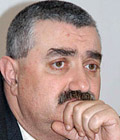– This week the foreign ministers of Armenia, Azerbaijan and Russia had a trilateral meeting in Moscow. Nothing has been published in the media about this meeting. Why are the details of this meeting kept confidential?
– The information I have received from different media sources create an impression for me that this was a working meeting for the purpose of launching the trilateral consultations following the OSCE summit in Astana. This was a quiet period that finished. This period was used to refine the process and find new opportunities to drive the process forward.
– It has been very rare that the media abstained from publishing information about such visits. Maybe they discussed the issue of not publishing any information not to originate noise or discontent.
– I have information from Azeri web sites that a roadmap or action plan is being drafted to be presented to the presidents of the two countries in the end of February.
– There are rumors that the risk of a war is bigger now. Even rumors say that it may happen in the end of this year or summer 2012.
– I don’t have such predictions but the risk is always big, as it has been every day since 1994. A very important thing happened during the summit in Astana: the Armenian president’s speech was very principal and it was understood and accepted by the people there. Second, the delegations of the Minsk group countries adopted a statement which clearly defines the format to be used for the peace negotiations. Going far from it does not help us to get closer to the solution. If the Azeri media outlets are true to say that in the end of February or in the beginning of March the presidents of Armenia, Azerbaijan and Russia will have a trilateral meeting, this draft should be improved because without such improvement it is meaningless.
– The recent meetings and negotiations took place in Russia and with Russia’s initiative. Will Russia be the main player in the future developments connected with the issue of Karabakh?
– It is a fact that Russia has the biggest influence in the region and its influence is bigger in the region than the factors of France or the US. Accordingly, the role of driving the process forward has been entrusted to Russia. I think this decision has been agreed between Russia, France and the US. I think Russia will drive this process forward during this year. It is the reason why the Russian foreign minister Sergy Lavrov announced that it has been agreed with the authorities of the country that it is not helpful to launch public discussions, people’s diplomacy and open discussions in a situation when the parties are seeking peace. The reason is the fact that discussions and the opportunity of finding joint solutions are jeopardized by public debates.
– Why did the other co-chair countries step back from the Karabakh conflict peaceful settlement process and adopted a passive policy connected with the issue.
– They entrusted the process for the purpose of a more successful improvement in the issue because Russia has a better influence and interests in the region.
– Why did it turn out that Russia out of the co-chair countries has a better opportunity to drive the process forward?
– It did not turn out unexpectedly; they came to this conclusion based on the processes of the past two or three years.
– Maybe the reason why Russia’s influence is bigger now is the fact that Armenia gave them this opportunity, maybe it is because Russia’s pressure on Armenia is bigger now.
– If so, why did Azerbaijan entrust the process to Russia as well? Because it was the realistic estimation of things on part of Armenia and Azerbaijan in this process. I would say that Russia has the biggest influence in the region and has the biggest opportunities to drive the process forward.
– What developments can we expect in the process of Karabakh conflict settlement?
– I think during this year a new document will be worked out enabling the parties to negotiate. This is the biggest expectation from this year. An action plan will be drafted enabling the parties to move forward in the negotiations.
– Azerbaijan has raised the issue of giving maximum autonomy to Karabakh in the territory of Azerbaijan. Do you think it is one of the routine announcements they have been making?
– In consideration of the fact that in the name of the co-chair countries Russia has taken the role of driving the negotiation process forward, this idea is being used by Azerbaijan to blackmail Russia. We already see the signs of this fact. The Azeri media is busy with blackmailing Russia to make it stray from the impartial and neutral negotiation mission and adopt a pro-Azeri policy. I think the Russian authorities should be resistant to these efforts on part of Azerbaijan.
– Don’t you think that by taking the issue of Karabakh conflict under control Russia wants not to settle the issue but to keep it under its control and manipulation?
– I honestly believe that the OSCE co-chairs are involved in this process with their volunteer will and with the mandate of March 1992 with the hope to make peace in the region with this process.

